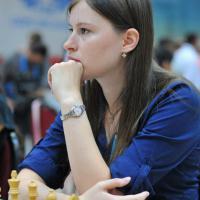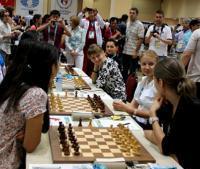
Game Analysis
Analyzing your games is one of the main ways of improving in chess. During this procedure you will be able to pinpoint your typical mistakes, as well as weaknesses & strengths. Your games are your business card in the world of chess.
Each person has their own approach to game analysis. Nevertheless, there are some common traits. When communicating with other chess players, I often learn new interesting ideas. The article offers some of the methods for you to consider.
There are two types of analysis – preliminary and deep. The first type is performed right after the game has been played, before the next round. The second one takes place after the end of the tournament.
Preliminary analysis
After the game has been played, it is useful to discuss it with the opponent. Nowadays this tradition is becoming less popular for a number of reasons. One of the common arguments is “why should I care what the patzer thinks, if I can go home and have the engine show me the right options?”. This snobbish reasoning doesn’t make much sense, because we humans learn by exchanging ideas and comparing opinions. If you understand why your partner made a good/bad move, it will help you much more than if you just take a look at the line suggested by your engine. Also, computers don’t give practical advice (“here you had weak light squares, so I decided to trade bishops and fix your pawns on certain squares to attack them in the upcoming endgame”). An interpreter is required to explain the ideas behind computer’s moves. At the recent Grand Prix in London you might have seen the world’s leading players hold post-mortem discussions. Notably, men are more likely to analyze games together than women. Of course, it is important not to overdo. For example, if you are playing in a demanding tournament (many rounds, 2 games per day), you might need to save yourself some time and energy. Try to find the right balance.
Second round: preliminary analysis at home (hotel room). Optimally, you should have a chess engine and a coach/second/friend to discuss the game with. Sometimes you can skip the post-mortem with your opponent, but this second round is a must. Don’t get too carried away: at this stage your goal is to fix some critical mistakes (bad time management, forgotten opening lines, poor tactics vision, etc.) in order to avoid them in the following rounds. Important: you have to review ALL the games. Some people think that if they won quickly, then there is nothing to look at – everything was great. Or, another shortcoming, some people don’t want to review their losses, because it depresses them. A strong chess player should be merciless towards himself, but in a constructive way: don't blame yourself, just try to perform better next time.
How does one analyze? There are many options. Some people write down their emotions and plans that they had in mind during the game. Others simply jot down the main lines they had been calculating. It depends on your working style and on the amount of time that you have at your disposal. Also, you should assess your emotional state before and after the game. This will help you see the whole picture. As you all know, psychology plays a vital role in chess.
After a preliminary analysis you should leave the game alone and start preparing for the next round. Don’t waste your energy on things that don’t matter anymore: “could I have saved that endgame?”, “what if I played c5 instead of e5 on move 1?”, “is there a middlegame plan that could have helped me trick the opponent?”. Also, don’t get too upset about losses/missed wins. What’s done cannot be undone. You can’t change the past, but you can affect the future.
Deep analysis
When the tournament is over, you can start working on increasing your chess mastery by correcting the weak spots in your game. Again, there are numerous ways of doing it. For example, you can start by analyzing the game yourself and then check your ideas with the chess engine. If you are lazy or don’t have enough time, you can analyze with the chess engine right away (not recommended for sub-master level). Performing some sort of automatic analysis is a strict no-no (some chess engines have those seemingly appealing modes – “the computer will take 30 seconds to review each of your moves and offer recommendations”). Your brain will degrade if you rely too much on computer evaluations. Remember that a PC won’t be at your fingertips during the tournament, so you have to learn to make choices on your own, without the guidance of our electronic assistants. Also, like I have already mentioned, we have to enhance our experience and knowledge by understanding certain principles and game situations, while computers have a unique solution to each particular situation. We can’t afford to follow in their footsteps, because our calculative skills are much worse.
During deep analysis you should find new ideas, the right continuations, outright blunders and hidden inaccuracies. Also, like a doctor, you should come up with a diagnosis: how the game proceeded, why, what “medicines” you should self-prescribe. Of course, having a coach is also helpful, because not all of us have the required expertise and objectivity.
By comparing your preliminary and deep analysis you can arrive at the right conclusions on what was going on, what you did wrong and why. Reminder: apart from the moves, ponder your psychological and physical states. Sometimes there are trivial matters that greatly affect the playing strength: you were nervous after being late for the game and having to run from the hotel room to the tournament hall; you didn’t eat well enough; your opponent won three games against you before, so your brain mentally gave up in advance, etc.
Chess is a complicated game, so even a deep analysis can sometimes include mistakes. For example, you might remember how the readers of Garry Kasparov’s “My great predecessors” books used to send him their suggestions and improvements which were included in the later editions. However, while perfection knows no limits, studying your own games carefully is the key to becoming a better player.
This year I had a very busy summer, when one event was following the other. As a result, I didn’t have enough time to review my own games carefully enough. Below you can see an example of a semi-deep analysis of a game from the Russia-China match: not comprehensive enough, but acceptable for making certain conclusions.






